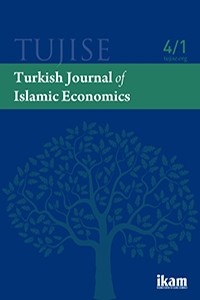ÇİFT BANKACILIK SİSTEMİNDE KREDİ KONTROL ARAÇLARI: KALDIRAÇ KONTROL ORANI –BİR ÖNERİ
İslamiyet faizi yasaklamaktadır. Bu durum merkez Bankası bağlamında iki soruyu gündeme getiriyor. Birincisi, geleneksel bankalar gibi İslami bankalarda kredi yaratabilirler mi? İslami bankaların kredi yaratmadan imtina edemiyeceğini iddia edecegiz, çünkü geleneksel rakipleriyle rekabet ederek piyasada ayakta kalabilmeleri gerekmektedir. Faiz oranının onlar için bir kontrol aracı olamıyacağı aşikardır. Bu durum bizi ikinci soruya götürüyor: İslami bankalar için faiz oranının yerine ne ikame edilebilir? Cevap olarak bu makale, Merkez bankasının kredi kontrol silahlarına ilave olarak ‘kaldıraç kontrol oranını’ (LCR) önermektedir. Anahtar Kelimeler: Merkez bankacılığı, kredi yaratma, kaldıraç control oranı, İslami bankalar, kar bölüşümü.
CREDIT CONTROL INSTRUMENTS IN A DUAL BANKING SYSTEM: LEVERAGE CONTROL RATE (LCR) – A PROPOSAL
Islam banishes interest. This raises two questions contextual to Central Banking. First, can Islamic banks create credit like the conventional? We shall argue that Islamic banks cannot avoid credit creation; an imperative for staying in the market where they operate in competition with their conventional rivals. Evidently, the interest rate policy would not be applicable to them as a control measure. This leads us to the second question: What could possibly replace the interest rate for Islamic banks? In reply, the paper suggests what it calls a leverage control rate (LCR) as an addition to Central Banks’ credit control arsenal. The proposed rate is derived from the sharing of profit ratio in Islamic banking. It is contended that the new measure has an edge over the old fashioned interest rate instrument which it can in fact replace with advantage. It can possibly be a common measure in a dual system. Key words: Central Banking; Credit creation; leverage control rate. (LCR); Islamic banks; Profit sharing
___
- A. K. Malim, Nurhafiza (2015): Financial Intermediation Costs in Islamic Banks: The Role of Bank-specific, Market-specific and Institutional-governance Factors (PhD dissertation)
- Cihak, M. and Hesse, H. (2010) ‘Islamic banks and financial stability: an empirical analysis’, Journal of Financial Services Research, vol. 38, pp. 95-113.
- Egmont, K.H (February, 2012): The emergence of profit and interest in the monetary circuit, University of Stuttgart, Institute of Economics and Law (On Line).
- El-Gamal (2014): Exploitative Profit Sharing: On the incoherence of all contract-based approaches to "Islamic finance "Accessed on 21/04/2014
- Hasan, M. & Dridi, J. (2010): ‘The Effects of Global Crisis on Islamic and Conventional Banks: A Comparative Study’, IMF Working Paper 10/201.
- Hasan Zubair (2015): Risk sharing versus risk transfer in Islamic finance: A critical Appraisal ISRA International Journal of Islamic Finance, Kuala Lumpur, Vol. 7, Issue 1 June.
- Hasan Z. (2014): Basel Accords financial turmoil and Islamic banking, ISRA International Journal of Islamic Finance, Kuala Lumpur Vol. 6 Issue 1, June.
- Hasan, Z. (2010): Profit sharing ratios in mudarabah contract revisited’, International Journal of Islamic Banking and Finance.,Vol. 7 No. 1. PP. 1-17
- Hasan, Z. (2005): Islamic banking at the cross roads: theory versus practice, in Iqbal, M, and Rodney, W (ed.) Islamic Perspectives on Wealth Creation, Edinburgh University Press
- Hasan, Z. (1988): Distributional equity in Islam, in Iqbal M. (Ed.) Distributive Justice and need fulfilment in an Islamic economy, Islamic Foundation, UK
- Higgs, Robert (2012) Regime Uncertainty, Then and Now, [Online], Available: http://www.fee.org/the_freeman/detail/regime-uncertainty-then-and-now#ixzz2M5ujJfFs
- Howladar, K. (2010) ‘Shariah risk: Understanding recent compliance issues in Islamic finance’, Moody’s Investor Service Report, p.1.
- Laldin, Akram et al (2013): Islamic legal maxims & their applications in Islamic finance, ISRA
- Keynes, J.M. (1930) ‘A treatise on money’, New York: Harcourt, Brace and company.
- Knight, F.H. (1921) ‘Risk, uncertainty and profit’, New York: Houghton Mifflin.
- Nabil, M.S. and Mirakhor, A. (2015): Risk Sharing and Shared Prosperity in Islamic Finance, Islamic Economic Studies, Vol. 23, No. 2, November.
- Sadr, Baqir-as (1984): Iqtisaduna (Our Economics, First Edition, Volume 2, English translation, World Organization for Islamic Services, Tehran, IRAN
- Başlangıç: 2014
- Yayıncı: Research Center for Islamic Economics (ikam)
